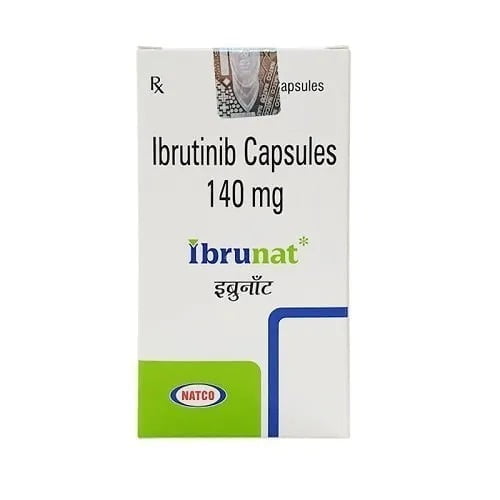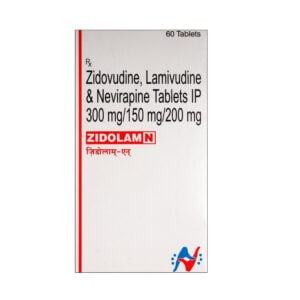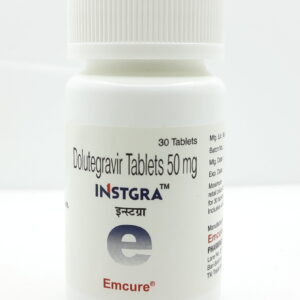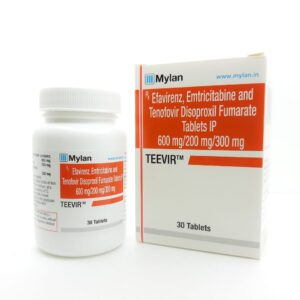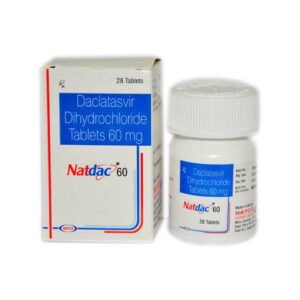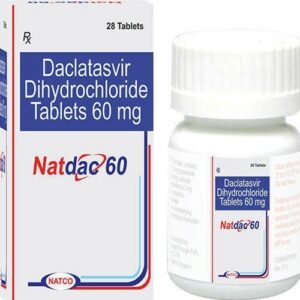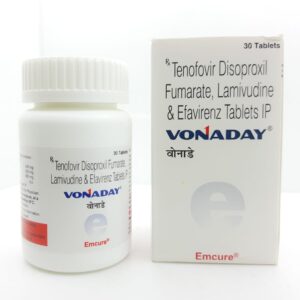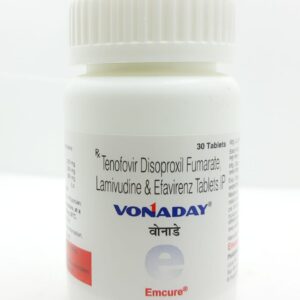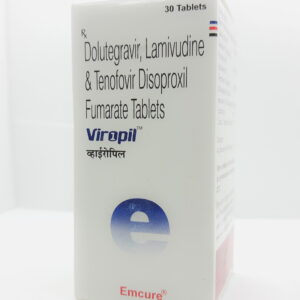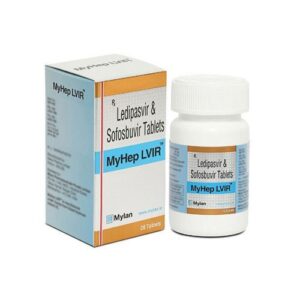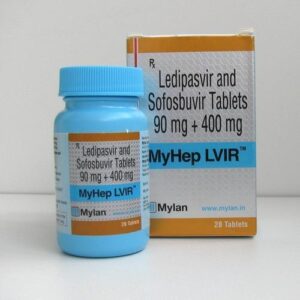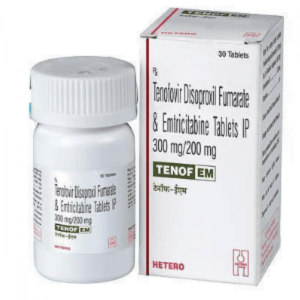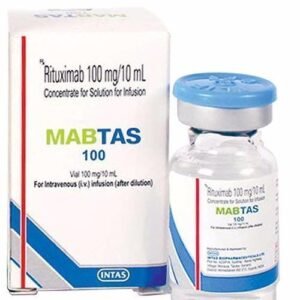Last Updated on September 7, 2025 by admin
About Ibrunat 140mg
Ibrunat 140mg Capsule is used in the treatment of mantle-cell lymphoma and blood cancer (chronic lymphocytic leukemia). It is also used in chronic lymphocytic leukaemia who have received at least one prior therapy.
Ibrunat 140mg Capsule is taken in a dose as advised by the doctor. The duration of treatment varies on the basis of your response to treatment. Your doctor may get regular blood tests to check number of blood cells during treatment with this medicine. It is known to reduce the number of blood cells in your blood thereby, increasing the susceptibility to infections. It may cause headache, diarrhea, and nausea as its side effects.
USES OF Ibrunat 140mg CAPSULE
- Mantle-cell lymphoma
- Blood cancer (Chronic lymphocytic leukemia)
SIDE EFFECTS OF Ibrunat 140mg CAPSULE
Most side effects do not require any medical attention and disappear as your body adjusts to the medicine. Consult your doctor if they persist or if you’re worried about them
Common side effects of Ibrunat 140mg
- Headache
- Fever
- Diarrhea
- Stomatitis (Inflammation of the mouth)
- Nausea
- Low blood platelets
- Decreased white blood cell count (neutrophils)
- Fatigue
- Musculoskeletal (bone, muscle or joint) pain
- Rash
- Anemia (low number of red blood cells)
- Bruising
- Muscle spasm
- Hemorrhage
- Pneumonia
- Cough
- Dry eye
- High blood pressure
- Weight loss
- Urinary tract infection
- Peripheral edema
- Subdural hematoma
- Second primary malignancies
Severe side effects of Ibrunat 140mg
- Tumor lysis syndrome
HOW TO USE Ibrunat 140mg CAPSULE
Take this medicine in the dose and duration as advised by your doctor. Ibrunat 140mg Capsule may be taken with or without food, but it is better to take it at a fixed time.
HOW Ibrunat 140mg CAPSULE WORKS
Ibrunat 140mg Capsule is a Bruton’s tyrosine kinase inhibitor. It works by blocking the action of the abnormal protein that signals cancer cells to multiply. This helps to stop or slow the spread of cancer cells.
SAFETY ADVICE
warnings
![]() Alcohol
Alcohol
CONSULT YOUR DOCTOR
It is not known whether it is safe to consume alcohol with Ibrunat 140mg Capsule. Please consult your doctor.
warnings
![]() Pregnancy
Pregnancy
CONSULT YOUR DOCTOR
Ibrunat 140mg Capsule is unsafe to use during pregnancy as there is definite evidence of risk to the developing baby. However, the doctor may rarely prescribe it in some life-threatening situations if the benefits are more than the potential risks. Please consult your doctor.
warnings
![]() Breast feeding
Breast feeding
CAUTION
Ibrunat 140mg Capsule should be used with caution during breastfeeding. Breastfeeding should be held until the treatment of the mother is completed and the drug is eliminated from her body.
warnings
![]() Driving
Driving
UNSAFE
Ibrunat 140mg Capsule may cause side effects which could affect your ability to drive.
warnings
![]() Kidney
Kidney
CAUTION
Ibrunat 140mg Capsule should be used with caution in patients with kidney disease. Dose adjustment of Ibrunat 140mg Capsule may be needed. Please consult your doctor.
warnings
![]() Liver
Liver
CAUTION
Ibrunat 140mg Capsule should be used with caution in patients with liver disease. Dose adjustment of Ibrunat 140mg Capsule may be needed. Please consult your doctor.
warnings
![]() CHILDREN CAUTION
CHILDREN CAUTION
UNSAFE
Ibrunat 140mg Capsule is not recommended for use in children and adolescents below 18 years.
![]() Ibrunat 140mg Capsule Habit Forming : NO
Ibrunat 140mg Capsule Habit Forming : NO
![]() expert advice
expert advice
- Take it at the same time every day, either with or without food.
- It is advisable to stay hydrated and drink plenty of fluids while taking this medication.
- Do not skip any dose and complete the course as suggested by your doctor.
- Use an effective method of birth control to avoid pregnancy while taking this medication.
- Your doctor may get regular blood tests done to monitor your liver function and blood cell count in your blood.
FOOD AND DRINK
- Eat a healthy and balanced diet. Eat vitamin and nutrient-rich food such as dark-green, yellow, orange, and red vegetables and fruit as it helps to boost your immune system. Option for lean protein and whole grains.
- Avoid eating raw meat and eggs. Consume properly boiled and cooked meat, poultry, or seafood.
- Eat bland and low-fat foods and avoid spicy or oily foods if you experience nausea or vomiting.
- Try to reduce emotional and physical stress by spending time with family or whatever makes you happy.
- Drink more fluids and avoid alcoholic beverages to prevent dehydration.
Wash your hands properly before and after eating. - Make sure you sleep at least 8 hours a day.
FAQs
Q 1. Can I take Ibrunat 140mg to prevent getting cancer in the future?
Ibrunat 140mg is not approved for use as a cancer prevention medication, and its long-term effects on healthy individuals are not fully understood. If you are concerned about your risk of developing cancer, you should speak with your doctor about appropriate cancer screening and prevention strategies.
Q 2. Can Ibrunat 140mg be taken with other medications?
Ibrunat 140mg can interact with other medications, so it is important to inform your doctor of all medications you are taking, including prescription, over-the-counter, and herbal supplements.
Q 3. How long do I need to take Ibrunat 140mg ?
The length of treatment with Ibrunat 140mg will depend on your specific condition and response to the medication. Your doctor will monitor your progress and determine the duration of treatment.
Q 4. Can I drink alcohol while taking Ibrunat 140mg ?
Alcohol consumption should be avoided while taking Ibrunat 140mg , as it may increase the risk of certain side effects, such as liver damage. You should talk to your doctor about any concerns you have regarding alcohol use.
Q 5. Can Ibrunat 140mg cure all types of cancer?
Ibrunat 140mg has been shown to be effective in treating certain types of blood cancers, but its efficacy in other types of cancer is still being studied. It is important to remember that cancer is a complex disease with many different causes and factors, and there is no single cure that works for all types of cancer. If you have been diagnosed with cancer, it is important to work with your doctor to determine the best treatment options for your specific case.
Q 6. Should I use contraception while under this Ibrunat 140mg capsule?
Yes, It is necessary to use contraception during and even after the last dose of Ibrunat 140mg capsule. Inform your doctor if you are pregnant or think you might be or if you are planning to get pregnant.
Here Some More 25 frequently asked questions (FAQs) about Ibrunat 140mg tablets, along with detailed answers:
General Information and Uses
Q1: What is Ibrunat 140mg used for?
A: Ibrunat 140mg is used to treat certain types of cancers, specifically B-cell malignancies. It is commonly used for chronic lymphocytic leukemia (CLL), small lymphocytic lymphoma (SLL), mantle cell lymphoma (MCL), Waldenström’s macroglobulinemia (WM), marginal zone lymphoma (MZL), and chronic graft-versus-host disease (cGVHD).
Q2: What are the common uses of Ibrunat 140mg?
A: Common uses include treatment of CLL, SLL, MCL, WM, MZL, and cGVHD. It works by inhibiting Bruton’s tyrosine kinase (BTK), a protein involved in the growth and survival of B-cells.
Q3: What is the recommended dosage of Ibrunat 140mg?
A: The recommended dosage varies depending on the condition being treated. For example, in CLL/SLL, the typical dose is 420 mg once daily, while in MCL, it may be 560 mg once daily. Always follow the dosage prescribed by your healthcare provider.
Q4: When is the best time to take Ibrunat 140mg?
A: Ibrunat 140mg should be taken at the same time each day. It can be taken with or without food, but it is essential to swallow the tablet whole with water and not crush, chew, or break it.
Safety and Side Effects
Q5: What are the long-term side effects of Ibrunat 140mg?
A: Long-term side effects can include increased risk of bleeding, atrial fibrillation, hypertension, infections, and cytopenias (low blood cell counts). Regular monitoring by a healthcare provider is necessary.
Q6: Is Ibrunat 140mg safe to use?
A: Ibrunat 140mg is considered safe for most patients when used as prescribed. However, it can have serious side effects, and patients must be monitored closely for adverse reactions.
Q7: Is Ibrunat 140mg safe in pregnancy?
A: Ibrunat 140mg is not recommended during pregnancy due to the potential risk to the fetus. Women of childbearing potential should use effective contraception during treatment and for some time after the last dose.
Q8: Can Ibrunat 140mg be used on children?
A: The safety and efficacy of Ibrunat 140mg in children have not been established. It is primarily used in adult patients.
Administration and Missed Doses
Q9: What if I miss a dose of Ibrunat 140mg?
A: If you miss a dose of Ibrunat 140mg, take it as soon as you remember on the same day. If it’s close to the time for your next dose, skip the missed dose and take the next dose at the regular time. Do not take two doses at once.
Q10: Can I stop taking Ibrunat 140mg?
A: Do not stop taking Ibrunat 140mg without consulting your healthcare provider. Abruptly stopping the medication can cause the disease to progress or worsen.
Efficacy and Success Rate
Q11: What is the success rate of Ibrunat 140mg?
A: Ibrunat 140mg has shown significant efficacy in treating various B-cell malignancies, with high response rates. The success rate varies depending on the specific condition and patient factors. For example, in CLL, it has demonstrated high rates of overall response and prolonged progression-free survival.
Q12: How long does it take for Ibrunat 140mg to show results?
A: The time to response can vary, but some patients may begin to see improvements within a few weeks of starting treatment. Full therapeutic effects may take several months.
Interactions and Precautions
Q13: Can Ibrunat 140mg interact with other medications?
A: Yes, Ibrunat 140mg can interact with other medications, including certain antifungals, antivirals, antibiotics, and blood thinners. Inform your healthcare provider about all medications, supplements, and herbal products you are taking.
Q14: What precautions should be taken while using Ibrunat 140mg?
A: Patients should avoid consuming grapefruit or grapefruit juice, as it can increase Ibrunat 140mg levels in the blood. Regular monitoring of blood counts, liver function, and blood pressure is also necessary. Avoid activities that may increase the risk of bleeding.
Alternatives and More Information
Q15: Are there alternative medications to Ibrunat 140mg?
A: Yes, alternatives include other BTK inhibitors like acalabrutinib and zanubrutinib. Other treatments depend on the specific type of cancer and may include chemotherapy, immunotherapy, or other targeted therapies.
Q16: Where can I get more information about Ibrunat 140mg?
A: More information can be obtained from your healthcare provider, pharmacists, and reputable medical websites such as the National Cancer Institute, Mayo Clinic, and the FDA. The medication’s package insert also contains detailed information.
Special Considerations
Q17: Does Ibrunat 140mg cure HIV infection?
A: No, Ibrunat 140mg does not cure HIV infection. It is specifically used for treating certain types of cancers and is not effective against HIV.
Q18: Can Ibrunat 140mg cause bleeding problems?
A: Yes, Ibrunat 140mg can increase the risk of bleeding. Patients should report any signs of unusual bleeding or bruising to their healthcare provider immediately.
Q19: Can Ibrunat 140mg cause heart problems?
A: Ibrunat 140mg can increase the risk of atrial fibrillation and hypertension. Patients should be monitored for signs of heart problems and manage any cardiovascular risk factors.
Q20: Is there a risk of infection with Ibrunat 140mg?
A: Yes, Ibrunat 140mg can increase the risk of infections due to its impact on the immune system. Patients should be vigilant about signs of infection and seek medical attention if they experience symptoms like fever or chills.
Q21: Can I consume alcohol while taking Ibrunat 140mg?
A: While there are no specific restrictions on alcohol, it’s best to discuss alcohol consumption with your healthcare provider, as it may exacerbate certain side effects or interact with the medication.
Q22: What dietary restrictions should I follow while taking Ibrunat 140mg?
A: Avoid grapefruit and grapefruit juice, as they can affect how the body metabolizes Ibrunat 140mg, potentially leading to increased side effects.
Q23: How should I store Ibrunat 140mg tablets?
A: Store Ibrunat 140mg at room temperature, away from moisture and heat. Keep it in its original container and out of reach of children.
Q24: Can Ibrunat 140mg cause liver issues?
A: Yes, Ibrunat 140mg can cause liver problems. Liver function tests should be conducted regularly, and patients should report any signs of liver issues, such as jaundice or dark urine.
Q25: How should I handle a suspected overdose of Ibrunat 140mg?
A: In case of an overdose, seek emergency medical attention immediately. Symptoms may include severe dizziness, fainting, or bleeding.
For more information, always consult your healthcare provider or refer to reputable medical resources. It’s essential to follow your healthcare provider’s guidance and report any unusual symptoms or concerns promptly.
References:
- Janssen-Cilag International Ltd, Electronic Medicines Compendium (EMC), [Revised on Dec 2021] [Accessed on 18th March 2023], https://www.medicines.org.uk/emc/files/pil.10040.pdf
- Janssen Biotech, Inc, US Food and Drug Administration, [Revised on May 2022] [ 18th March 2023], https://www.imbruvica.com/files/prescribing-information.pdf
- H.G. Watson, J.I.O. Craig, L.M. Manson, Blood disease, Davidson’s Principles and Practice of Medicine, 22nd Edition, 2014, 989-1056.
- Sapna Parmar, Khilna Patel, Javier Pinilla-Ibarz, Ibrutinib (Imbruvica): A Novel Targeted Therapy for Chronic Lymphocytic Leukemia, Drug Forecast, Published on July 2014; Accessed on 18th March 2023]; https://www.ncbi.nlm.nih.gov/pmc/articles/PMC4103574/pdf/ptj3907483.pdf

